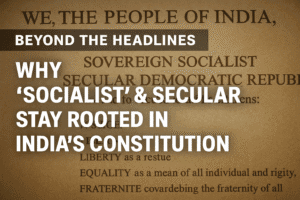Beyond the Headlines: Why “Socialist” & “Secular” Stay Rooted in India’s Constitution
The Indian government has firmly ruled out any current plan to remove the words “socialist” and “secular” from the Constitution’s preamble, explicitly stating in Parliament that no formal process exists to reconsider these terms. This clarification responds directly to speculation and acknowledges that while vocal advocacy groups may fuel public debate, their actions do not reflect official policy. The stance underscores that altering these foundational principles would require extraordinary consensus, a threshold far from being met.
Crucially, the government anchors its position in a recent Supreme Court ruling (November 2024) which affirmed Parliament’s power to amend the preamble while interpreting “socialist” as denoting India’s welfare state commitment and “secular” as integral to its identity. These terms, added in 1976, remain protected symbols of constitutional intent for the foreseeable future.

The words “socialist” and “secular” embedded in the Preamble of the Indian Constitution remain firmly in place, with the Union Government explicitly stating it has no current plans to reconsider or remove them. This definitive clarification, delivered in Parliament on July 24th, 2025, cuts through swirling speculation and underscores the stability of these foundational principles – at least for the foreseeable future.
The Government’s Unequivocal Stance:
Responding to a pointed query from Samajwadi Party MP Ramji Lal Suman in the Rajya Sabha, the Ministry of Law and Justice laid out its position with clarity:
- No Formal Process: “As of now, the government has no plan to reconsider or remove the words ‘socialist’ and ‘secular’ from the preamble of the Constitution.” Crucially, it confirmed that “no formal process has been initiated” to alter these provisions.
- Public Discourse vs. Official Action: While acknowledging “discussions or debates in certain public or political circles” and the possibility that “certain groups are expressing opinions or advocating for reconsideration,” the Ministry drew a sharp distinction. It emphasized that such activities, even if creating an “atmosphere,” “do not necessarily reflect the official stance or actions of the government.”
- The Bar for Amendment: The government reiterated the significant procedural hurdle any such change would face, stating amendments to the Preamble would require “thorough deliberation and broad consensus” – a bar currently unmet and unapproached by any formal government initiative.
Roots of the Query and the Words Themselves:
MP Suman’s questions tapped into persistent debates within India’s vibrant, often contentious, political landscape:
- Is the government moving towards reconsidering “socialist” and “secular”?
- Is an atmosphere being created by certain social organisations to push this?
- What is the government’s stand?
The words themselves have a specific history. They were not part of the original 1950 Preamble. They were inserted via the 42nd Constitutional Amendment Act of 1976 during the Emergency period under Prime Minister Indira Gandhi. This amendment aimed to explicitly codify these concepts as core constitutional values.
The Enduring Legal Backdrop:
The Ministry bolstered its response by citing a significant Supreme Court judgment from November 2024 (Dr. Balram Singh and Others v. Union of India and Another). This ruling:
- Affirmed Parliament’s Power: It upheld Parliament’s authority to amend the Constitution, explicitly extending this power to the Preamble itself.
- Interpreted the Terms: Crucially, the Court interpreted “socialism” in the Indian context as signifying a commitment to a “welfare state” – focusing on social justice, reducing inequalities, and ensuring basic necessities – clarifying it does not inherently impede private sector growth. It simultaneously reaffirmed “secularism” as an “integral” part of the Constitution’s basic structure, emphasizing the state’s duty to treat all religions equally.
Why This Clarification Matters Now:
This official statement serves several critical purposes:
- Quelling Speculation: It directly addresses and dismisses ongoing rumors and anxieties about an imminent constitutional shift regarding these ideologically charged terms.
- Reaffirming Foundational Values: It publicly reiterates the government’s current adherence to the constitutional principles of a welfare-oriented state (“socialist”) and religious equality/non-discrimination (“secular”) as defined by the Supreme Court.
- Distinguishing Noise from Policy: It highlights a fundamental aspect of Indian democracy: while diverse voices and vigorous public debate are essential, formal constitutional change is a deliberate, high-threshold process distinct from the opinions of pressure groups or media discourse.
- Emphasizing Stability: In a time of rapid social and political change, the statement underscores the enduring nature of the constitutional framework, even concerning terms added later.
The Takeaway:
The words “socialist” and “secular” in India’s Preamble are not relics up for casual removal. The government has firmly stated its lack of intent to initiate any such change, anchoring itself in both the current constitutional interpretation by the Supreme Court and the recognition that altering the nation’s foundational document demands an extraordinary consensus far beyond the reach of fleeting political debates or advocacy group campaigns. Their presence continues to symbolize India’s constitutional commitment – however interpreted in practice – to social welfare and religious pluralism.
You must be logged in to post a comment.